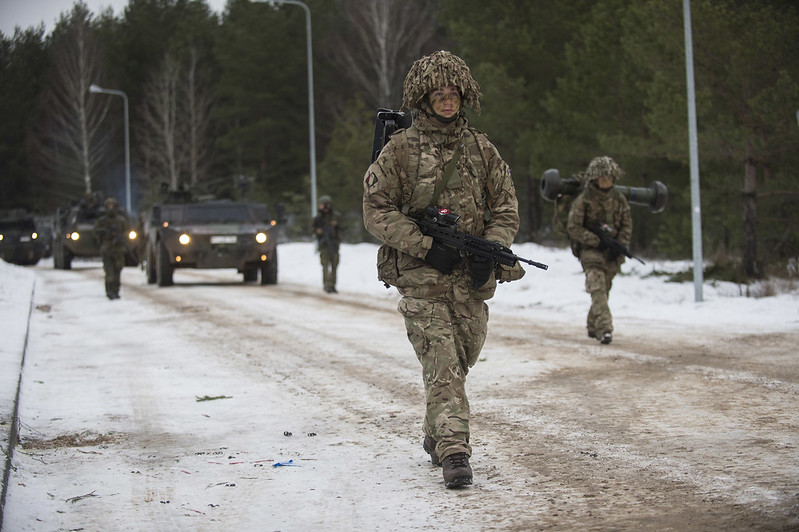
British and German troops take part in the distinguished visitors day during Exercise Iron Sword near Vilnius, Lithuania on 2nd December 2016. NATO Photo by SSgt Dan Bardsley GBR A 0R7
In Foreign Policy, John Healey and Nils Schmid make the case that closer coordination between German and British defense structures can strengthen European security. They write:
The United Kingdom and Germany must enhance defense cooperation to strengthen European security after the illegal invasion of Ukraine. That is the conclusion of a landmark report from Germany’s Friedrich-Ebert-Stiftung (FES) foundation and Britain-based think tank the Royal United Services Institute (RUSI) that was published last week.
We strongly welcome this report and want a far-reaching U.K.-German defense and security agreement struck within six months of the next U.K. general election, as a joint initiative between U.K. Labour Party leader Keir Starmer and German Chancellor Olaf Scholz.
This will increase jobs, strengthen NATO, and keep both countries safe.
While Russia’s illegal invasion of Ukraine in 2022 has made the case for greater collaboration much stronger, we commissioned this FES-RUSI program of work in autumn 2021, before the war.
The report outlines 19 recommendations to enhance U.K.-German defense cooperation, including how the U.K. and Germany could develop a bilateral treaty, work together more on joint procurement projects, and increase collaboration between the U.K. Armed Forces and German Bundeswehr on operations and training.
The two nations have compatible forces, collaborative industry, and common values. The U.K. Armed Forces and German Bundeswehr have a long history of operating and exercising together and a deep common understanding through British bases in Germany.
But we believe collaboration remains underdeveloped, especially compared to other major allies.
The U.K. and France signed the Lancaster House Treaties in 2010, to increase defense cooperation with technology sharing, joint procurement, and the launch of the Combined Joint Expeditionary Force. Germany and France are likewise committed to wide-ranging cooperation through the 2020 Aachen Treaty (an update to the 1963 Élysée Treaty). But there’s no such treaty-based security relationship between the U.K. and Germany.
Without one, collaboration has been ad hoc rather than systematic. For example, there have been 40 years of cooperation between the U.K. and Germany on fighter jets, and both countries have operated together in Kosovo and Afghanistan, and to counter the Islamic State. In March this year, the Royal Air Force and German Air Force started flying together as part of NATO’s joint air policing missions in Estonia for the first time, intercepting Russian planes.
Yet just 28 German personnel are currently training in the U.K.; and only six U.K. personnel are training in Germany, including a single Brit with each of the German Navy and German Air Force.
Industrial collaboration via joint procurement programs is one of the most visible and important forms of military cooperation between allies. Just as Tornado and Eurofighter jets—the products of multinational collaboration—have helped keep Europe safe in recent decades, so the British Army’s Boxer armored vehicle program is seeing vehicles built in the U.K. and benefitting from German expertise. However, there is currently only one bilateral defense procurement program between the U.K. and Germany, set to upgrade “wide wet gap crossing” capability, plus just eight multilateral procurement projects that involve both nations alongside others.
Allies are a strategic strength. We believe closer U.K.-German defense, security, and foreign-policy cooperation can greatly strengthen the two countries’ abilities to respond to shared challenges and protect their citizens.
Read more here.
If you’re willing to fight for Main Street America, click here to sign up for the Richardcyoung.com free weekly email.




